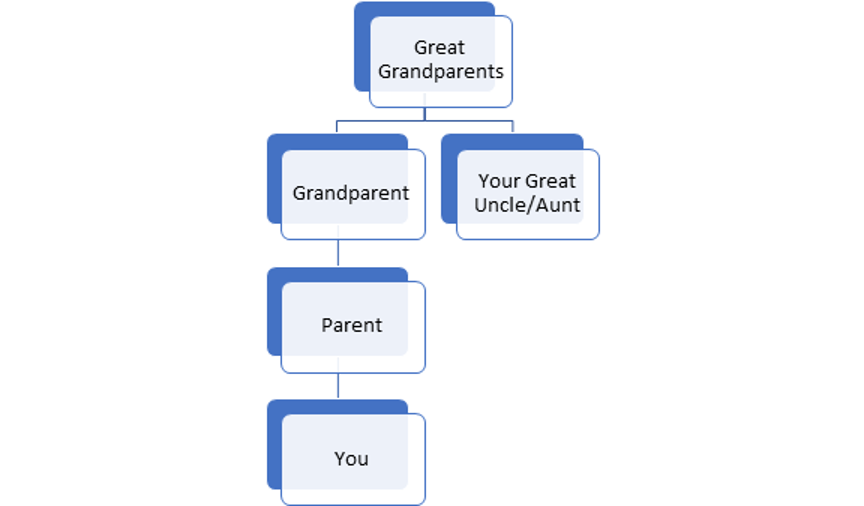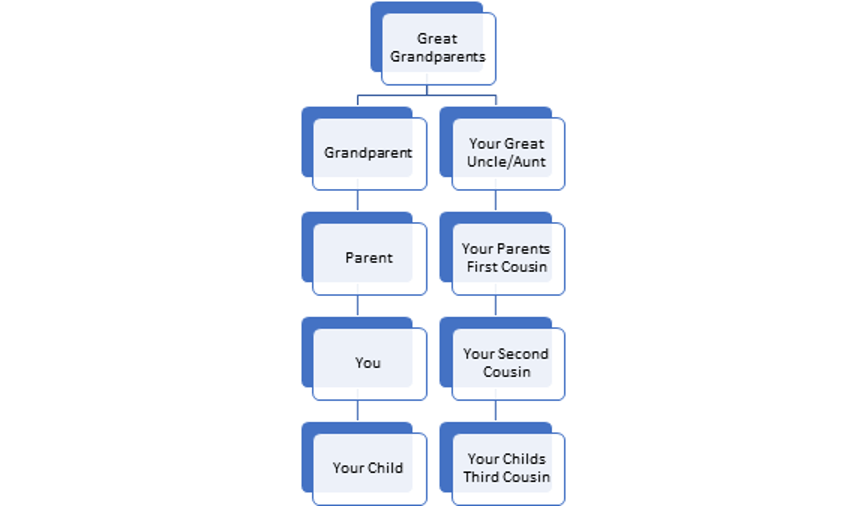What is a Great Uncle or a Great Aunt?
Are you interested to know what a great aunt or uncle is is and whether you are genetically related to them? In this article, we'll help you understand what a great aunt/uncle is, whether they are considered family, and what DNA results might say.
We are likely to know at least some of our uncles or aunts assuming of course that our parents are not both only children. They are our parents' siblings and they may often play a major part of our lives. There is another term though, great uncle or aunt, what does this mean?
Ancestry is Our Top Recommendation
If you love genealogy and family history research, then you must know Ancestry. They are the best way to discover the rich stories of your family!
With over 30 billion (seriously!) records in their database, you can research your family and discover amazing details you may never have known about your ancestors.
With a 14-day free trial, it's very easy to get started and discover your past!
Get Started →What Are Great Uncles and Aunts?
You may have fantastic uncles or aunts but just to be clear this is not what is meant by a great uncle/aunt. This is a specific relationship within a family that may seem like an extended family relationship but is actually considered close. Your great uncle or aunt would be a sibling of one of your grandparents.

Your great grandparents are the parents of your great uncle or aunt. This means that we are not directly descended from our great uncle or aunt, we are descended from their parents through our grandparents.
What Makes You a Great Uncle or Aunt?
Due to a vast age difference between myself as the youngest and my sister who is the oldest I actually became a great uncle at 38 years old. I obviously feigned dismay at having such a seemingly elderly title forced upon me in the prime of my life.
If then you have great nieces or nephews these children would be the offspring of your nieces or nephews. You are the sibling of those children’s grandparents. If you are a full sibling to their grandparent then you are a great uncle or aunt. However, if you are just half-siblings with their grandparent you are a half great uncle or aunt.
Do We Know Our Great Uncles and Aunts?
Great uncles and aunts are considered close relatives because they are the siblings of our grandparents. It is likely that if our grandparents are part of our lives we would at least know the names of some of their siblings.

As mentioned, I myself am a great uncle and to this point, I have 11 great nieces or nephews. In fact, in 15 – 20 years it is entirely conceivable that I could become a great-granduncle.
Many people will have at least heard of their great uncles or aunts if not actually meeting them. It can often depend on where in the order of your great grandparents' children your grandparent falls. If they are the youngest it may be less likely that you might know any of their siblings. If they are the oldest then your great aunts and uncles may be around longer than your grandparents.
What Is a Half Great Uncle or Aunt?
Your connection to your great uncles and aunts is very dependent on their connection with their siblings. If, for instance, they have the same mother but two different fathers then they would only be half-siblings. This means that their half-sibling would only be your half great aunt or uncle.
Is it Great Uncle or Grand Uncle?
We call our direct ancestors our grandparents but should we call their siblings grandaunts or granduncles? There are two schools of thought regarding this very topic with some favoring great uncle/aunt while others use the term granduncle or grandaunt.
The argument for using grand is that it matches the generational terms for our grandparents, grandfather or grandmother. Some feel that we shouldn’t use the term great until the next generation, being the siblings of our great grandparents.
There is no real argument for using great over grand other than people seem to like the term. It is not strictly speaking incorrect even if it may confuse things a little generationally speaking. I have to admit I prefer the term great uncle because granduncle just makes me feel so much older!
The terms, then, are both acceptable and it really depends on the family in question. Regardless of the term as long as you understand the meaning and connection you share with that relative that is what is important.
What Is a Great Granduncle?
As I mentioned one day it is conceivable that I will be around long enough to become a great-granduncle. This would mean that one of my great-nieces or nephews has had a child to whom I would be the great-granduncle. As the brother of their great grandparent and uncle to their grandparent they would not be directly related to me but we would likely share DNA.
Are Great Uncles or Aunts Related by Blood?
As the siblings of an individual's grandparent, we are not direct ancestors to them but we do share a measurable amount of DNA. On average we likely share 12.5% of the same DNA with our great uncles or aunts but that can also range between 4 – 23%.
Despite the fact that we can share as little as 4% of the same DNA with great aunts or uncles we do still share common DNA. If they are only half great uncles or aunts we do likely share less DNA because we only have one common ancestor.
What Are the Descendants of Our Great Aunts and Uncles To Us?
We of course now know how we are related to our great aunts and uncles but what about their descendants, what are they to us? Well, as they all share ancestors in common with us they become our cousins.

As the above graphic shows, your great aunt or uncle's grandchild would be your second cousin. That second cousin's children would be your second cousin once removed but the third cousin to any children you may have.
It is from the various generations of aunts and uncles that our countless cousins descend. Our uncles and aunts give us our first cousins. The second cousins come from our great uncles and aunts and this continues with each level of cousin.
Conclusion
Great uncles and aunts are close relatives to us although they are not direct ancestors. They are the brothers and sisters of our grandparents. We very likely have met some of them or at least know who they were.
It is from the various generations of our ancestor's siblings that we get all of our cousins that help make up our extended and distant family members.
Link To or Reference This Page
We spent a lot of time downloading, cleaning, merging, and formatting the data that is shown on the site.
If you found the data or information on this page useful in your research, please use the tool below to properly cite or reference Name Census as the source. We appreciate your support!
-
<a href="https://namecensus.com/blog/what-is-a-great-uncle-or-a-great-aunt/">What is a Great Uncle or a Great Aunt?</a>
-
"What is a Great Uncle or a Great Aunt?". NameCensus.com. Accessed on April 19, 2024. https://namecensus.com/blog/what-is-a-great-uncle-or-a-great-aunt/.
-
"What is a Great Uncle or a Great Aunt?". NameCensus.com, https://namecensus.com/blog/what-is-a-great-uncle-or-a-great-aunt/. Accessed 19 April, 2024
-
What is a Great Uncle or a Great Aunt?. NameCensus.com. Retrieved from https://namecensus.com/blog/what-is-a-great-uncle-or-a-great-aunt/.
